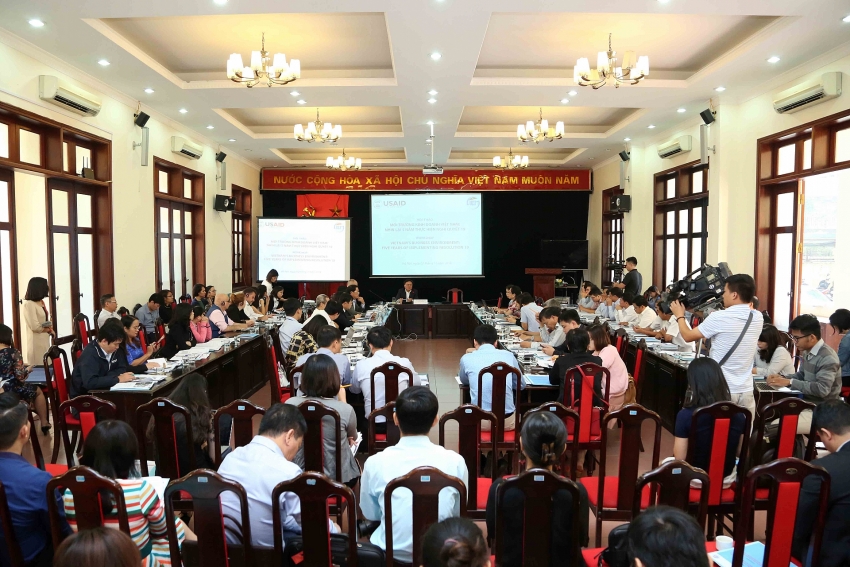Businesses spend one month and ten days on tax and insurance
 |
| Even though there have been marked improvements in the Vietnamese business environment, businesses still spend a month and ten days to do away with their tax and insurance obligations |
Tax procedures take far too long
At the Workshop on Vietnam's Business Environment – Five years of implementing Resolution 19 held by the Central Institute of Economic Management (CIEM) on November 2, the Vietnam Tax Consultants' Association (VTCA) reported that businesses have spent a total of 498 hours per year, equalling 41 working days (12 hours of working a day) to pay taxes in 2018.
Notably, the time for the preparation of dossiers of corporate income tax, value-added tax, and social insurance was 457 hours per year, equivalent to one month and eight working days, according to the VTCA.
Vietnam's Paying Taxes index ranks 131th out of 190 economies in the World Bank’s Doing Business 2019 Report, which has just been announced on October 31, down 45 steps since last year. Although all the indicators of the Paying Taxes category have improved in the Doing Business 2019 Report, the time needed to pay taxes has not reduced since previous years.
Accordingly, the time spent on paying taxes in East Asia and the Pacific was only 180.9 hours per year, and 159.4 hours in high-income OECD countries, much better than the 498 hours of Vietnam.
Nguyen Dinh Cung, director of the CIEM, said that over the five years of implementing Resolution 19, Vietnam’s position and approach to the business environment has become more objective and proper. The government has agreed with and used the assessment of international organisations and the World Bank to draw up reforms.
According to Cung, Vietnam's targets are being "softened." For example, in early 2018, the government asked to cut 50 per cent of business and conditions and licenses. However, this was too difficult and the government changed the target of "cutting" to "reducing" and "simplifying" 50 per cent of them. "The barriers which we cut will disappear, but those which we reduce and simplify, will remain obstacles, and the effectiveness of reforms will be low," said Cung.
He emphasised that Vietnam will gain much by reaching international standards in administrative procedures, but there are many tasks to do to improve performance.
Vietnam ranks 69th in Doing Business
Over the five years of implementing Resolution 19, Vietnam’s Doing Business ranking has gone from 78th and 90th (2014, 2015) to 68th and 69th (in the past two years) out of 190 economies.
According to Nguyen Minh Thao, head of the CIEM’s Business Environment and Competitiveness Department, although Vietnam has not improved in terms of ranking in the past two years, there has been improvements in seven out of ten indicators. “The country fell one step from 68th to 69th because other countries improved faster than us. Vietnam should accelerate the speed of improvement to catch up to other countries,” she explained.
In the first year of Resolution 19 it was only carried out by the Ministry of Finance, Vietnam Electricity Group (EVN), and Ho Chi Minh City. In the next years, other ministries, agencies, and localities joined the implementation. In 2017 and 2018, most of them were proactively carrying it out, although enthusiasm and outcomes varied. Thereby, the business environment has been improving well.
The dealing with construction permits and getting electricity were the two indicators that improved the most, stepping up 19 and 37 steps, respectively, against last year, while registering property and enforcing contracts also improved by three and four steps.
Vietnam has surpassed the Philippines to rank fourth in the ASEAN, becoming a member of the ASEAN 4. Despite the improvement, the country’s business environment does not reach the average standards of the ASEAN 4, but the gaps have been narrowing.
However, the fastest improvers in the region have maintained their ranking. Singapore maintains its second position over the last three years (2016-2018), while Thailand have been 26th and 27th after climbing 20 steps, and Indonesia stands 72th and 73th after climbing 19 steps.
What the stars mean:
★ Poor ★ ★ Promising ★★★ Good ★★★★ Very good ★★★★★ Exceptional
Related Contents
Latest News
More News
- Vietnamese businesses diversify amid global trade shifts (February 03, 2026 | 17:18)
- Consumer finance sector posts sharp profit growth (February 03, 2026 | 13:05)
- Vietnam and US to launch sixth trade negotiation round (January 30, 2026 | 15:19)
- NAB Innovation Centre underscores Vietnam’s appeal for tech investment (January 30, 2026 | 11:16)
- Vietnam moves towards market-based fuel management with E10 rollout (January 30, 2026 | 11:10)
- Vietnam startup funding enters a period of capital reset (January 30, 2026 | 11:06)
- Vietnam strengthens public debt management with World Bank and IMF (January 30, 2026 | 11:00)
- PM inspects APEC 2027 project progress in An Giang province (January 29, 2026 | 09:00)
- Vietnam among the world’s top 15 trading nations (January 28, 2026 | 17:12)
- Vietnam accelerates preparations for arbitration centre linked to new financial hub (January 28, 2026 | 17:09)

 Tag:
Tag:


























 Mobile Version
Mobile Version